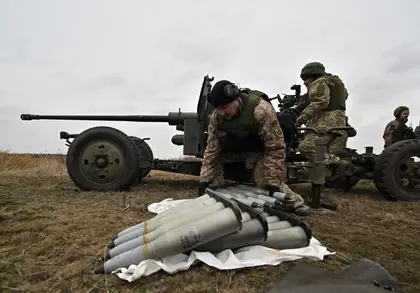Ukrainian forces and volunteer battalions have worked hard to defend their country against Russian aggression.
During the first year of the war, the Ukrainians protected their capital. They forced the Russians out of central and northern Ukraine. The Ukrainians defended major cities such as Chernihiv and Sumy in the north and Kharkiv in the east. They protected Odesa in the south, and they liberated Kherson from Russian occupation.
JOIN US ON TELEGRAM
Follow our coverage of the war on the @Kyivpost_official.
Then, in 2023, Ukrainian forces reclaimed more than half of the Russian-occupied territory. They destroyed two-thirds of Russia’s tank force. They also made significant progress on the Black Sea. To date, Ukraine has destroyed 25 Russian military vessels and ships and one submarine, accounting for one-third of Russia’s Black Sea Fleet. Finally, Ukrainians launched operations to disrupt Russian movements around Crimea.
But progress is now in jeopardy. According to recent reports, Ukrainian forces are running out of ammunition. If the Ukrainians do not have sufficient equipment to defeat Russian forces, then Ukraine could risk losing more territory.
There have already been worrying results. For example, Avdiivka, a gateway to Donetsk, was captured by Russian forces. The fall of this city was attributed in part to the West’s slow ability to sufficiently supply the Ukrainians.
How did this happen? For several months, the United States, NATO, the European Union, and several other countries and institutions have delayed sending arms to Ukraine. Take, for example, the United States. In October 2023, deliberations began in the House and Senate to pass a new supplemental aid package that would send aid to Israel, Ukraine, and Taiwan. For several months, Republican and Democratic members in both chambers of Congress debated and revised the legislation. Four months later, the bill was passed in the Senate in February 2024, but the House has yet to vote on the foreign aid package. This assistance cannot be sent unless both chambers of Congress pass the bill.

How US Loopholes and Lax Enforcement Fuel Russian Sanction Busting, Prolong Ukraine War
Similarly, the European Union stalled its latest assistance package. In June 2023, the European Union proposed a new assistance package for Ukraine. It was delayed as members within the organization debated the cost and impact. The assistance package was finally passed in February 2024, eight months after its initial proposal.
While the West has these delays, the Russian Federation has ramped up its capabilities. Russia has purchased large quantities of missiles, drones, weapons, and ammunition from Iran and North Korea. This has allowed Russia to continue its unjust war in Ukraine. In addition, CNN reported that Russia is producing “nearly three times more artillery munitions than the US and Europe.” This suggests that Russia is winning the ammunition war.
How is this possible? To date, Russia is the most sanctioned country in the world. Several of its key financial institutions have been cut off from SWIFT, the international financial messaging system. Russia’s economy has declined. Thousands of companies suspended their business operations, and sanctions have made it more difficult for Russia to trade on the international stage. But Russia has overcome these obstacles by collaborating with the Iranians, North Koreans, and Chinese.
It is inconceivable that NATO and the EU are being outpaced by their adversaries. How, then, can the West address these issues? How can Ukraine receive aid faster?
First, NATO and the EU should expand defense manufacturing. Creating new defense factories would boost American and European economies. It would lead to job growth, as thousands of citizens would become employed. A large workforce would lead to faster production time for military equipment and hardware. This would give the Ukrainians the equipment they need for the war in a timelier manner. It would also allow NATO and EU to replenish their stockpiles. According to Ukrainian nonprofit organization PR Army, the US and EU have begun this effort.
Second, NATO and the EU should encourage technology sharing. Allowing interoperability between countries would enhance their communication and training capabilities. Interoperability also “reduces duplication, enables pooling of resources, and produces synergies among all allies.” Information sharing would help address any manufacturing setbacks. It would allow Western countries to play to each other’s strengths, and it would reduce the burden associated with manufacturing equipment.
Finally, NATO and the EU should speed up the delivery time of weapons to Ukraine. Delays in production have prolonged the timeline in which Ukraine receives Western equipment. But defense innovation can shorten these timelines. For example, the Czechs are revamping older equipment and weapons to provide them to Ukraine faster. Western countries are also purchasing equipment that has already been made from countries outside of Europe so that it can be sent to the Ukrainians. This has significantly reduced delays in sending aid to Ukraine.
Overall, obstructions in sending weapons to Ukraine allowed the Russians to regroup and fortify their positions in southern and eastern Ukraine. Russia has also undermined international sanctions efforts by purchasing equipment for its war from Iran and North Korea.
Now, it has been reported that Russia is preparing for a new offensive this summer. The Russians cannot be allowed to succeed. The West needs to modernize its industrial base, and it must send weapons to Ukraine more quickly and efficiently.
Innovation will achieve this goal. Changes in Western defense acquisition policy will strengthen the West’s defense capabilities, and it will enhance their national security. It will also help Ukraine win the war.
Mark Temnycky is an accredited freelance journalist covering Eurasian affairs and a nonresident fellow at the Atlantic Council’s Eurasia Center. He can be found on X @MTemnycky
The views expressed in this opinion article are the author’s and not necessarily those of Kyiv Post.
You can also highlight the text and press Ctrl + Enter










